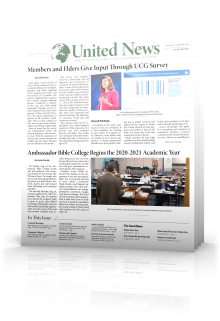Members and Elders Give Input Through UCG Survey

Conducted in January of this year, over 3,000 people responded. Typically, surveys receive responses from under three percent of those surveyed. However, this survey represented 23 percent of all members worldwide. That so many continue to take time to give input demonstrates concern that is appreciated.
Keep in mind that the survey was administered before the current pandemic and economic crisis. With the suspension of services and current measures to modify services, these elements are not reflected in the results.
The survey was administered by a third-party and all responses were anonymous. It contained 50 open-ended questions. A team with backgrounds in research analyzed the answers and the results were presented to the Council of Elders and Administration in July. The entire survey had a margin of error of +/- 1.8 at a 99% confidence rate. All open-ended responses were read and categorized to determine the number of times specific ideas were expressed and the size of themes. The following is a summary of the data and comments received.
The majority of the survey respondents were adult baptized members. Of the responses, 18.4 percent were from ordained deacons and elders. The results were primarily from older membership with only 5.3 percent of the respondents being under the age of 25.
Overall Findings
In looking at the many ways local services are conducted, it is clear members are working to serve others on a regular basis. However, some believe they are unable to serve due to age, distance or being homebound. Members are also regularly making use of online sermons and appreciate the degree to which the United Church of God supports one’s ability to learn God’s truth. For many, this is the sole connection to the Church.
While members do have high confidence in their understanding around fundamental beliefs and truths, they continue to be hesitant in directly promoting UCG.
Across all groups, the quality of speaking and amount of manpower remains a concern consistent with results from prior years. Many are unwilling to recommend contact with UCG because they do not believe it is their role, or they have concerns over what the guest will experience at services. Specifically, that components from the home office (website, literature, Beyond Today) are polished, but the local halls or the congregation itself are not as welcoming.
Most of all, respondents are consistently very positive about their local pastor (and wife) and the amount of work and service they provide to members. This is notably higher than in prior years.
Next Steps & Conclusion
While there were many positive comments, surveys by their nature highlight areas to explore and additional work to be done. This year, the biggest takeaways focus on five key aspects:
1. Invest in improving speaking at services. Whether sermonettes or sermons, develop programs around continuing to improve the content and delivery of messages.
“One of the greatest weaknesses of my congregation—and most congregations—is the quality and effectiveness of the weekly Sabbath messages. Training should be conducted or subsidized for all those given the responsibility to speak in order to help them develop the skills and tools to speak effectively and in line with basic princip[les] of learning and development, not just technically doctrinally correct messages. I believe this is key for the church to continue to grow, and to properly feed not only those veterans in the church but the newly converted.”
2. Establish a consistent and minimum standard toward the quality of meeting halls. This is new this year, along with a desire to own meeting halls, but is perceived as being able to help local congregations thrive and grow.
3. Explore the balance of programs and resources devoted to Preaching the Gospel and Preparing a People. The respondents understand these are hard choices.
4. The engagement at services, whether that be rich, spiritual conversations or involving more of the membership in service. Especially beyond elements of speaking, there is a real desire for more members to reach out and check in on one another and make sure everyone feels included in fellowship and activities. Many desire an experience similar to this comment:
“We are a close-knit family. Eating a potluck meal together every week after services and prolonging the fellowshipping has truly contributed to our closeness. Some of us have formed special ‘study-buddy’ relationships which continually stirs up the spirit within us, just as it should. I am so grateful to have been called by God and to be a part of this congregation I am with!”
5. There is deep admiration for the service and work pastors and their wives do for the members. There is a need to perhaps adjust expectation on how much can be done with smaller overall membership and concern they are spread too thin.
• “Although my pastor has more on his plate than most people could handle, I think he does an excellent job. However, I do worry that he is asked to do too much.”
• “Our pastor is one of the most humble and serving people I have ever met! We are very, very blessed to have him and his wife with us!!”
The survey administration team would like to express its appreciation to all those who took the time to participate in the survey. Many of the insights and findings included actionable and helpful ideas and the data represents a statistically sound representation due to the efforts of those that contributed.
While one of the comments stated, “I feel overall that considering our budget and manpower situation, we are doing a superb job…it is an honor to be asked periodically as is the case here,” it is just as important to recognize everyone who shared their thoughts. Thank you.
Julie Brown


